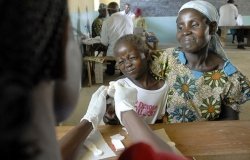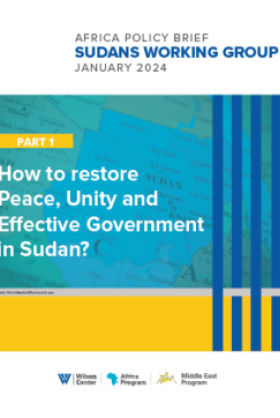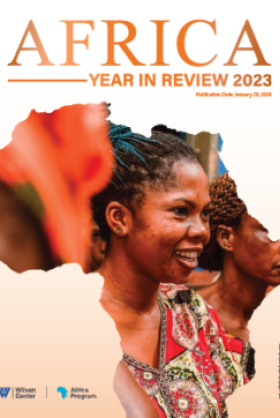Business Solutions to Nutrition
Jake Walter, Mozambique Country Director, TechnoServe; Ron Croushorn, Director of the Food Assistance Division for the Foreign Agriculture Service, USDA; J.B. Cordaro, Global Business Adviser, Mars, Inc.; Michael McBurney, Head of Scientific Affairs, DSM Nutritional Products Ltd.; Kate Houston, Director of Federal Government Relations, Cargill
Overview
Jake Walter, Mozambique Country Director, TechnoServe; Ron Croushorn, Director of the Food Assistance Division for the Foreign Agriculture Service, USDA; J.B. Cordaro, Global Business Adviser, Mars, Inc.; Michael McBurney, Head of Scientific Affairs, DSM Nutritional Products Ltd.; Kate Houston, Director of Federal Government Relations, Cargill
Over the past several years and following the 2008 food price crisis, there has been a renewed commitment to improving food security and nutrition in the developing world. The Obama administration's commitment to spend $3.5 billion on agricultural development over three years, and the USDA's Feed the Future Initiative have helped catalyze a new wave of public-private partnerships to achieve these goals. On June 14, 2010, the Africa Program of the Woodrow Wilson International Center for Scholars, TechnoServe and the Partnership to Cut Hunger and Poverty in Africa hosted a panel-discussion on emerging models for public-private sector collaboration to improve nutrition in developing countries.
A New Dialogue
"We're seeing a real sea change right now, after decades of U.S. disinvestment in agriculture and food security in developing countries," said Julie Howard, Executive Director and Chief Executive Officer of the Partnership to Cut Hunger and Poverty in Africa. Moderating the first panel, she observed that a new dialogue has been taking place since 2008 that deals with country-level priorities, recognizes "the central role of the private sector," and incorporates nutrition into rural development agendas.
"Investing in agriculture is not just about giving people something to eat every day," she said. According to a recent study, agricultural development is two to four times more effective than other sources of GDP growth in reducing poverty.
Long-Term Demand Drivers
Jake Walter, the Mozambique country director for TechnoServe, outlined their highly successful program developing the local poultry industry. Before the program was launched, small-scale poultry producers in Mozambique were crowded out by frozen Brazilian poultry shipped through Dubai that was often at the tail-end of its shelf life. TechnoServe worked with Mozambique's government to regulate these imports and create a level playing field, while partnering with Cargill and SAFE to provide local farmers with world-class training, services, and supplies to boost their productivity. A national advertising campaign featuring a memorable jingle helped change consumption behavior.
"This is a success story," Walter said. Poultry consumption in Mozambique increased 20% annually and the domestic market share skyrocketed to 75% from 25% in 2005. TechnoServe is now looking to expand their program. "We're recognizing that food is a system," he said. Competitive maize production was the underlying factor for success in poultry farming. TechnoServe is now helping a new class of entrepreneurial women start up maize mills. These mills will be the "point of leverage" to address nutrition and food security issues, he said.
Ron Croushorn, Director of the Food Assistance Division for the Foreign Agriculture Service, USDA, specified that Food for Progress contributed $12 million in grants to TechnoServe's operations in Mozambique out of a $200 million annual budget. While emphasizing the difficulty of mobilizing the private sector, Croushorn highlighted TechnoServe's program as an example of the new wave of initiatives that identify long-term demand drivers, and create sustainable growth.
Harnessing the Private Sector
The second panel featured representatives from multinational corporations implementing new programs to improve nutrition in the developing world. Moderator Mick Madnick, Deputy Director of the Global Alliance for Improved Nutrition (GAIN), pointed to the three hundred million people GAIN has affected through public-private partnerships, and exhorted those in the field to build on the existing momentum. "There are windows of opportunity and windows of interest and window of attention," he said. The current window must be seized by both the private sector and an "enabling policy environment."
DSM Nutritional Products, Inc, the world leader for vitamin supplements is strategically placed to improve health through targeted food fortification initiatives. "We recognize that for $0.40 per person, per year, we could address all micronutrient deficiencies in the world…but how do we do that in a business-sustainable model?" asked Michael McBurney, Head of Scientific Affairs. McBurney highlighted DSM's MixMe sachet program, developed in partnership with the World Food Programme. The sachets, which meet a person's complete micronutrient needs, reached $18 billion in sales last year.
The Profit Motive
"We believe that we can add the best social value, when there is a fit between a social need and a core business competency" Kate Houston, Director of Federal Government Relations for Cargill, Inc., said. She described a program that Cargill designed in India to fortify edible oils. The program resulted in a 10-20% increase in sales, compensating for the increase in costs for Cargill. However, Houston recognized, "the poorest citizens often do not have access or cannot afford the fortified oils." An audience member also raised the point about the fortified oil industry's competition with local producers. Houston expressed interest in providing not only fortified oils produced by Cargill, but also the possibility for locally produced products to be fortified with the same nutrient mix.
J.B. Cordaro, a consultant for Mars, Inc., stressed that social goods can be pursued in tandem with the profit-motive. "We will still be seeking profits and growth…but we will be looking at different time and growth horizons," he said. Mars's first initiative, Mars Opportunities for Mothers (MOM), will provide trainings and safe food to pregnant and lactating women in Ghana and Côte d'Ivoire while "providing income to small-holder farmers by sourcing local commodities…and providing access to micro finance."
Business interests in food security, nutrition and agricultural development are growing, not only with an increased emphasis on corporate social responsibility, but also with a view towards changing the platform of engagement in the developing world. Business relationships are flourishing, and are being initiated with increasing frequency by the private sector both independently and in conjunction with the public sector. The business model allows for the possibility of sustained growth in the nutrition and agricultural sectors, and for information sharing that doesn't create a dependency on food aid or other forms of international investment.
Hosted By

Africa Program
The Africa Program works to address the most critical issues facing Africa and US-Africa relations, build mutually beneficial US-Africa relations, and enhance knowledge and understanding about Africa in the United States. The Program achieves its mission through in-depth research and analyses, public discussion, working groups, and briefings that bring together policymakers, practitioners, and subject matter experts to analyze and offer practical options for tackling key challenges in Africa and in US-Africa relations. Read more
Thank you for your interest in this event. Please send any feedback or questions to our Events staff.










